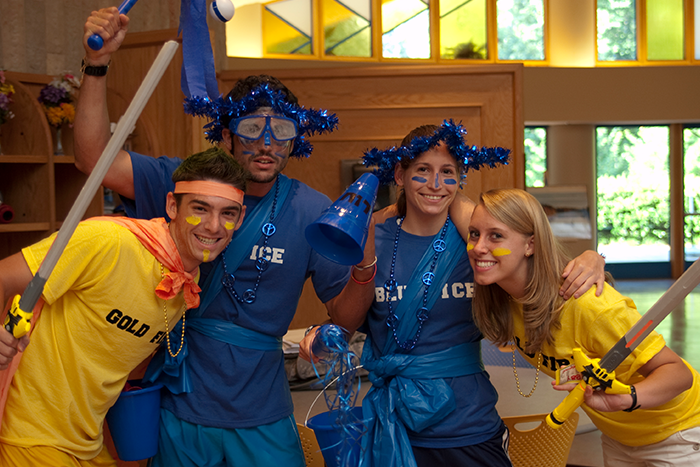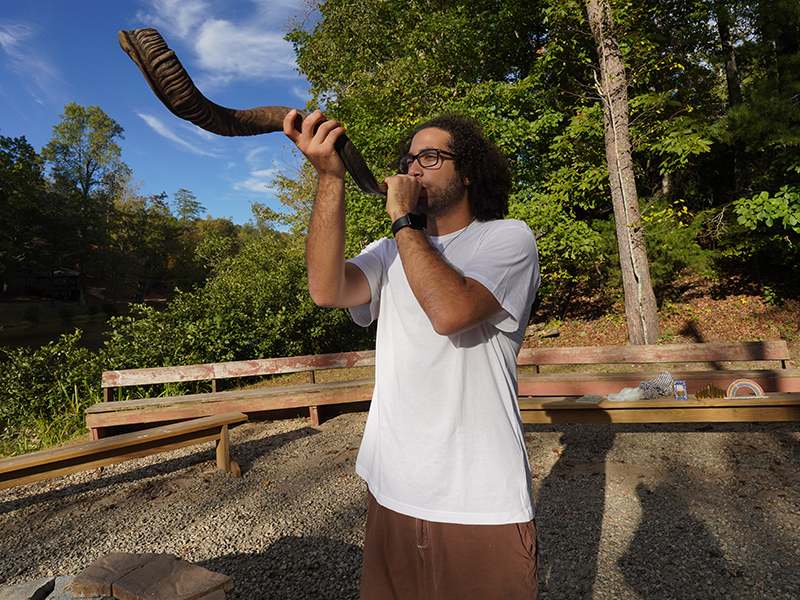
Ever wonder how a Jewish summer camp runs? Get to know camp using this glossary, which will introduce you to a typical day at camp including mealtime, staff, periods of the day, and special events/trips for campers.
Things in the Dining Hall (Chadar Ochel)
Mealtime at camp is comprised of many elements. It is common for campers to start and end the same way, with a prayer about the food, and for the dining hall to be full of songs and cheering.
The Motzi: The blessing we say before each meal. The final words of this blessing are hamotzi lechem min haaretz, meaning "Who brings forth bread from the earth."
Birkat HaMazon (blessing over the food): The blessing we say after each meal to thank God for the food we just ate.
Unit Cheers: Each unit has its own cheers that are sometimes sung after meals.
Breaks: During the announcements, units may “break” the evening program by performing a skit to announce the evening program or other special occasions at camp.
Song Session: The music team leads the camp in a few songs and dance after some meals. Additionally, after Friday night Shabbat services there is a special Shabbat song session.
People
Camp is made up of many people who make it function and run smoothly.
Leadership Team: The people who make the camp magic happen! This includes the camp director and assistant directors, program director, head counselor, and unit heads.
Unit Head: Oversees each unit. Responsible for the safety of the campers and staff, implementation of policies and procedures, mentoring staff members, and helping train new staff members.
Programmers: Responsible for unit programming, evening programs, and other unit programs.
Counselors: Oversee the campers in their bunk and unit at all times. These young adults are role models and educators.
Specialists: Teach the campers their specialty area – hiking, archery, arts and crafts and more!
Health Center Staff: Health center staff are experienced nurses and doctors. This staff includes day nurses, overnight nurses, health center assistants, and doctors.
Support Staff: Security, office, kitchen, housekeeping, and maintenance staff.
Faculty: Rabbis, Cantors, and Jewish Educators. They support t’fillah, b'nei mitzvah (bar/bat mitzvah) tutoring, and programming.
Periods of the Day
These are some of the standard activities you may find on the daily schedule at a Jewish summer camp.
Nikayon (cleanliness): Cabin clean up time - each bunk spends a period cleaning up.
Menucha (rest): Rest hour - after lunch, campers and counselors return to their cabins. Campers are not required to sleep, but this is generally a quiet time; good time for reading and/or writing letters, etc.
Etgar (challenge): Specialty period, where campers have an opportunity to challenge themselves with different activities. For example, at URJ Camp Coleman in Cleveland, GA, campers can choose from ropes courses, campscape (camp craft and garden), Israeli Scouts, fishing, and nature.
Tarbut (culture): Campers participate in various activities. Campers can choose from dance, drumming, drama, Krav Maga (self defense), archery, music, song leading, chess, and comedy.
Omanut (art): Campers participate in arts activities including ceramics, arts and crafts, video, Jewish cooking, photography, and metalworking.
Sports: Sports choices often include roller hockey, tennis, basketball, fitness, gaga, and more.
Swim: Fun in the sun, the pool, and the lake!
Chofesh (free time): This is a daily free play period where campers can choose which activities they attend. The available activities vary, and staff are positioned around camp so that campers can go to their activities of choice.
Dinner Prep: Shower time right before dinner. Everyone is in their cabins
Evening Program: Campers participate in a program with their unit, such as Minute to Win It, Pool Party, Israel Defense Force Night, and more.
Trip Days/Special Events at Camp:
While for the most part, campers spend most of their time at camp, there are some days where they take trips and have other special events at camp.
These activities vary from visiting water parks, amusement parks, white water rafting, and other outdoor adventures, campers would not necessarily experience during a typical day at camp.
Maccabiah (Color War): A camp-wide event centered around a theme in which campers break into different teams and compete. Each team is assigned a color, a camper captain, and staff captains. The teams participate in a variety of activities including sports, rope burn, and a marathon. Smaller groups within each team are responsible for the “Creative Presentations”, creating a plaque, alma mater and entrance (skit). A winner is announced at the end of the event.
Explore Jewish Life and Get Inspired
Subscribe for Emails
